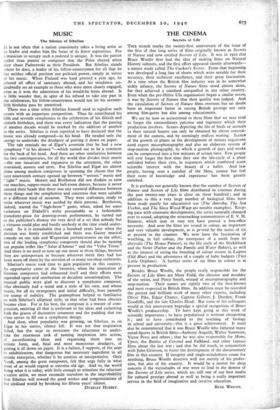MUSIC
The Silence of Sibelius IT is not often that a nation consciously takes a living artist as its leader and makes him the focus of its finest aspirations. For a musician to occupy such a pedestal is unique. It was the patriot rather than pianist or composer that the Poles elected when they chose Paderewski as their President. But Sibelius stands where he does, a leader of his fellow-countrymen for all that he has neither official position nor political power, simply in virtue of his music. When Finland was hard pressed a year ago, he refused all offers of sanctuary abroad, and his steadiness un- doubtedly set an example to those who were more closely engaged, even as it won the admiration of his would-be hosts abroad. It is little wonder that, in spite of his refusal to take any part in the celebration, his fellow-countrymen would not let his seventy- fifth birthday pass by unnoticed.
There was a time when Sibelius himself used to signalise such events with an important composition. Thus he contributed his fifth and seventh symphonies to the celebration of his fiftieth and sixtieth birthdays, and there was every. indication that the passing of another decade would be marked by the addition of another to the series. Sibelius is even reported to have declared that the music was already composed—in his head. He needed only the energy to undertake the drudgery of putting it down on paper.
The tale reminds me of Elgar's assertion that he had a new symphony " in his drawer "—which turned out to be a synonym for the back of his head. And there are other similarities between the two contemporaries, for all the world that divides their music —the one luxuriant and expansive to the uttermost, the other restrained, austere and terse. For Sibelius and Eiger are almost alone among modern composers in spanning the chasm that the later nineteenth century opened up between " serious " music and " light" music. Mozart and Beethoven did not disdain to turn out marches, supper-music and ball-room dances, because it never entered their heads that there was any essential difference between these things and the symphonies and concertos that were suitable to a different kind of occasion. They were craftsmen, ready to write whatever music was needed by their patrons. Beethoven, indeed, started the " high-brow " game, when, asked for some variations on Diabelli's waltz presumably as a fashionable pianoforte-piece for drawing-room performance, he turned out to the publisher's dismay the very devil of a set that nobody but a virtuoso could play and hardly anybody at the time could under- stand. So it is remarkable that a hundred years later when the division was firmly established and there was Gaiety musical comedy on one side and Wagnerian portentousness on the other, two of the leading symphonic composers should also be turning out popular trifles like " Salut d'Amour " and the " Valse Triste." And there is no need to turn up our noses at these things, because they are unimportant or because whatever merit they had has been worn off them by the attrition of so many tea-shop orchestras.
Sibelius's music took time to gain popularity in this country.
Its opportunity came in the 'twenties, when the inspiration of German composers had exhausted itself and their efforts were expended upon arid cerebration or decadent sensationalism. The musical public were glad to discover a symphonic composer, who obviously had a mind and a style of his own, and whose music, for all its strangeness and initial difficulty, bore patently the stamp of nobility. The gramophone helped to familiarise us with Sibelius's elliptical style, so that what had been obscure became clear. For at his best, the composer is a master of com- pression, omitting all that is irrelevant to his ideas and eschewing both the graces of decorative ornament and the padding that too often serves to fill out a symphonic design.
And then, when popularity was growing, on Sibelius, as on Eiger in his sixties, silence fell. It was not that inspiration failed, but the urge to overcome the reluctance to under- take the enormous task of turning inspiration into action, of co-ordinating ideas and organising them into an artistic form, and, final and most monstrous drudgery, of getting it all down on paper. It is a failure, I suppose, of the urge to exhibitionism, that dangerous but necessary ingredient in all artistic enterprise, whether It be creative or interpretative. Only Verdi, among the great composers, felt that urge fully in what most of us would regard as extreme old age. And so, the world being what it is today, with little enough to stimulate the reluctant creative artist, we must reconcile ourselves to the improbability that Sibelius will reward the good wishes and congratulations of the civilised world by breaking his fifteen years' silence.
D1'NELEY HUSSEY.


























 Previous page
Previous page